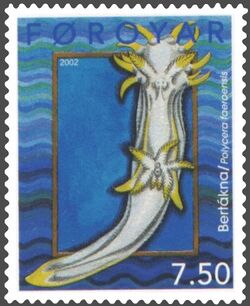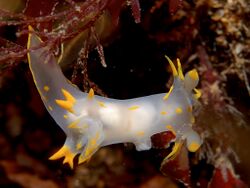Biology:Polycera faeroensis
| Polycera faeroensis | |
|---|---|

| |
| Polycera faeroensis at 2002 Faroe Islands stamp made by Astrid Andreasen and published by Postverk Føroya. | |
| Scientific classification | |
| Domain: | Eukaryota |
| Kingdom: | Animalia |
| Phylum: | Mollusca |
| Class: | Gastropoda |
| Subclass: | Heterobranchia |
| Order: | Nudibranchia |
| Suborder: | Doridina |
| Superfamily: | Polyceroidea |
| Family: | Polyceridae |
| Genus: | Polycera |
| Species: | P. faeroensis
|
| Binomial name | |
| Polycera faeroensis Lemche, 1929
| |
Polycera faeroensis is a species of sea slug, a dorid nudibranch, a shell-less marine gastropod mollusk in the family Polyceridae.
Distribution
This nudibranch is described originally from Faeroe Islands. In the northeast Atlantic it is a common species in shallow water as far south as Portugal.[1][2]
Description
The body of this nudibranch is translucent white with yellow processes and a yellow line along the ridge of the tail. The oral veil has eight or more yellow projections. The gills and rhinophores are translucent white, tipped with yellow. Alongside the gills the pallial margin is expanded and gives rise to a pair or a series of yellow-tipped projections. Some individuals have yellow spots or lines on the body. The animal may reach 30mm in total length. It is distinguished from Polycera quadrilineata in having more than six processes on the oral veil and a more squat body shape.[3]
Ecology
Polycera faeroensis feeds on erect bryozoans Bicellariella ciliata, Bugula flabellata and family Crisiidae.[1]
References
- ↑ 1.0 1.1 Picton, B.E. & Morrow, C.C., 2010. Polycera faeroensis [In] Encyclopedia of Marine Life of Britain and Ireland.
- ↑ Rudman, W.B., 2001 (February 4) Polycera faeroensis Lemche, 1929. [In] Sea Slug Forum. Australian Museum, Sydney.
- ↑ Thompson, T.E. 1988. Molluscs: Benthic Opisthobranchs. Linnean Society of London. ISBN:90 04 08439 8
External links
- Photos of Polycera faeroensis on Sealife Collection
Wikidata ☰ Q845283 entry
 |


